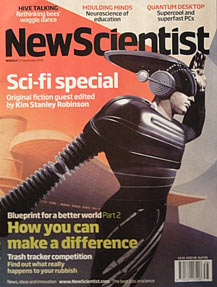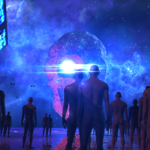I would strongly argue that science fiction is the most important literary genre that exists today. Not only do I say this because it is my favourite genre of fiction (on the rare occasions that I do read fiction it’s almost always sci-fi – and, I have to admit, it’s almost always Philip K. Dick). I say this because as a genre it does something better than any other, which is to hold up a mirror to our current prejudices and perspectives and show us the often ugly truths that hide beneath the surface.
Science fiction is always remarkably current, reflecting the dreams and fears of the moment in which each work was written. The history of science fiction reads like a history of human progress, it is beautiful and enticing and yet at the same time unpredictable and frightening. We really have no idea where we are headed, or even where we are right now, and science fiction shows us this better than anything else ever could.
New Scientist today released a great issue, which has a number of pages devoted to the genre of sci-fi overseen by one of the genre’s masters Kim Stanley Robinson. I have to admit, I did think there would be a bit more to their ‘sci-fi special’ then a few pages towards the back (although there are a few relevant articles before the designated section, such as one on quantum computing and another on traveling to Mars) – but I’m very happy to let that go considering how consistently great a publication New Scientist is, and the fact that they cover the repercussions of future technology in every single issue.
Definitely go and pick up a copy – it’s out for the next week – as there are some great little pieces within it as they ask many of today’s British sci-fi writers what they think the world will look like in the next 100 years. Kim Stanley Robinson even puts out a nice little challenge for all of us aspiring writers (along with a jibe at the predictable winners of the Booker Prize…what’s that, another historical period novel?): which is to consider how the world will look like in exactly 100 years. Not ten, not five hundred – one century from now.
The thoughts that surround this challenge really highlight the difficulties that are going to face our global civilization and the rest of the planet’s ecosystem. Even within our current lifetimes we are more than likely to see exhilarating highs and unimaginable lows of humanity’s history. It’s time we started to think about it – all of us – because it’s coming whether we like it or not…
[ad name=”Google Adsense-Link Banner x4″]





